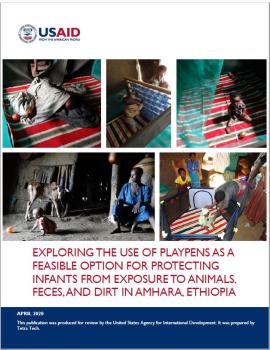Exploring the Use of Playpens as a Feasible Option for Protecting Infants from Exposure to Animals, Feces, and Dirt in Amhara, Ethiopia
Mounting evidence suggests that animal feces ingestion is responsible for significant disease burden and growth faltering in infants and young children (IYC). The literature also points to exploratory mouthing of contaminated objects and direct ingestion of animal feces and soil playing a larger role in transmitting disease to IYC than previously recognized. The study described in this report explores the potential for a protective play space (or playpen) to help caregivers create a “safe zone” that reduces children’s exposure to fecal pathogens, both animal and human, through exploratory mouthing and geophagy.
The USAID Water, Sanitation, and Hygiene Partnerships and Learning for Sustainability (WASHPaLS) Project, in collaboration with USAID/Ethiopia, the Amhara (Ethiopia) Public Health Institute, Plan International/Ethiopia, and the USAID Transform WASH Project, conducted behavioral research to determine if it is feasible and appealing for rural households to consistently and safely use and maintain a protective playpen for IYC. We assessed feasibility and appeal by providing a playpen along with some behavior change motivation to households and documented use and maintenance, perceived benefits, obstacles to use and maintenance, family and community reactions, and preferred playpen attributes that facilitated use.
View related resources:


